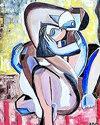见证了创伤记忆
IF 0.3
4区 社会学
0 HUMANITIES, MULTIDISCIPLINARY
ANGELAKI-JOURNAL OF THE THEORETICAL HUMANITIES
Pub Date : 2022-03-04
DOI:10.1080/0969725X.2022.2046377
引用次数: 0
摘要
摘要本文着眼于美籍华裔作家刘的推理小说《终结历史的人——纪录片》中所设想的有问题的见证,在这部小说中,通过时间旅行实现了回到过去的虚拟见证。刘的写作为见证的见证提供了一种纪实叙事,它扩展了见证的时间维度,并允许在虚构和事实之间流动。这一思想实验为目睹的交织行为和表现提供了一个视角,以蚀刻创伤事件的目睹和见证的伦理,特别是在全球背景下。笔者认为,刘的中篇小说揭示了“修复记忆”产生的伦理关系见证,并影响到纪念后和被牵连的主体。虚拟现实见证赋予了见证人强有力的代理权,同时也引发了道德问题。刘的写作表明,当通过道德情感引导时,证人和证词都以一种可能的道德方式引导着共同记忆的道路;虚拟现实见证产生了与历史经验的私人接触,而不是一个人的生活经验。因此,当证人和证词被视为持续的关系行为,以及当见证和记忆变得政治化和工具化时,我确定了证人和证词的道德利害关系和可能的解决方案。首先,证人作证受到质疑和争论,特别是在犯罪者的证词方面。我认为,犯罪者的证词可以将创伤转化为集体记忆,而不是个人救赎。关于见证中的负面情绪的争论,我认为,通过负面道德情绪,道德见证及其见证是有动机的,尽管它们经常被回避或挪用。此外,我通过与过去的评价距离来协商证人和证词中的敏感性,证明了刘的作品中表达了移情见证。刘的移情叙事建立在他对历史创伤的调查和对结构创伤的思考之上。本文章由计算机程序翻译,如有差异,请以英文原文为准。
BEARING WITNESS TO TRAUMATIC MEMORY
Abstract This article looks at the problematic witnessing envisioned in Chinese American writer Ken Liu’s speculative fiction “The Man Who Ended History – A Documentary,” in which the back-to-the-past virtual witness is actualized through time travel. Ken Liu’s writing contributes a documentary narrative of the witnessing of witnessing that extends the temporal dimension of witness and allows the flow between fictive and factual. This thought experiment posits a perspective into the interweaving acts and performances of witnessing to etch the ethics in witnessing and testimony of traumatic events, particularly in the global context. I argue that Liu’s novella uncovers the ethical relational witnessing in which “prosthetic memory” is produced and that affects postmemorial and the implicated subjects. The virtual reality witnessing bestows a strong agency upon witnesses while yet ethical concerns arise. Liu’s writing shows that witness and testimony both steer the path to shared memory in a possibly ethical way when channelled through moral emotions; virtual reality witnessing generates the private contact with historical experiences rather than one’s lived experiences. Thus, I identify the ethical stakes and possible settlements in witness and testimony when they are taken as continuing, relational acts, and as performances of emotional, sensuous experience, when witnessing and remembering become politicized and instrumentalized. Firstly, witnessing is problematized and debated particularly in terms of the perpetrator’s testimony. I argue that the perpetrator’s testimony can transfer trauma into collective remembering rather than individual redemption. On the debate over negative emotions in witnessing, I argue that through negative moral emotions ethical witnessing and its testimony are motivated, though they are often evaded or appropriated. Further, I demonstrate that empathetic witnessing is indicated in Liu’s writing, by negotiating the sensitivity in witness and testimony with an evaluative distance from the past. Liu’s empathetic narrative is founded on his investigation of historical trauma and his meditation on structural trauma.
求助全文
通过发布文献求助,成功后即可免费获取论文全文。
去求助
来源期刊

ANGELAKI-JOURNAL OF THE THEORETICAL HUMANITIES
HUMANITIES, MULTIDISCIPLINARY-
CiteScore
0.60
自引率
33.30%
发文量
57
期刊介绍:
Angelaki: journal of the theoretical humanities was established in September 1993 to provide an international forum for vanguard work in the theoretical humanities. In itself a contentious category, "theoretical humanities" represents the productive nexus of work in the disciplinary fields of literary criticism and theory, philosophy, and cultural studies. The journal is dedicated to the refreshing of intellectual coordinates, and to the challenging and vivifying process of re-thinking. Angelaki: journal of the theoretical humanities encourages a critical engagement with theory in terms of disciplinary development and intellectual and political usefulness, the inquiry into and articulation of culture.
 求助内容:
求助内容: 应助结果提醒方式:
应助结果提醒方式:


